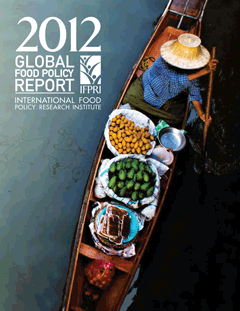Drawing on rigorous research and sound evidence, IFPRI’s today released 2012 Global Food Policy Report discusses major food policy developments in 2012 like the increase of agricultural research and development funding, progress toward a green economy, and the drivers of future global food security. Contributing authors P.K. Joshi, director of IFPRI South Asia, and Senior Research Fellow Devesh Roy, covered some of the challenges South Asia faced in 2012 and potential opportunities in 2013 like the ongoing policy challenges and regional trade barriers, and efforts by government to increase inter-country partnerships.
Contributing authors P.K. Joshi, director of IFPRI South Asia, and Senior Research Fellow Devesh Roy, covered some of the challenges South Asia faced in 2012 and potential opportunities in 2013 like the ongoing policy challenges and regional trade barriers, and efforts by government to increase inter-country partnerships.
Looking at the past decade South Asia’s average annual growth in agriculture has been 3 per cent, more or less, compared with other Southeast and East Asian countries. Despite achieving self-sufficiency in food grain production last year, Bangladesh, India, and Nepal showcased poor agricultural performance due to a variety of unpredicted weather events like monsoons, flooding, and drought. To address the food security challenge the Bangladeshi government is working on a Country Investment plan that incorporates 12 programs that improve availability, access and utilization of food.
Political uncertainty, weak governance combined with huge implementation gaps, bureaucratic control, regulation and reform delay continues to be an unsolvable puzzle, however, recently a few policy decisions have been made at both country and regional levels that have boosted agricultural growth in South Asia.
Fertilizer subsidy in a major policy distortion in the south Asia region. The Indian subsidy policy in fertilizer led the Nepalese government to increase, by almost double, their fertilizer subsidy for the year 2013. This policy change will benefit farmers by allowing them to buy legal fertilizers at reasonable prices as well as benefiting small, local fertilizer businesses. Another major and controversial issue is related to the release of a genetically modified crop, Bt eggplant, in India. The Bt eggplant, which could help small holder farmers increase production with limited use of pesticides, was barred from release due to food safety, biodiversity and environmental concerns. But recently, a long awaited decision on Foreign Direct Investment (FDI) was approved with an investment cap of 51 percent for multi-brand retail. “FDI in India will strengthen the back-end process with reduction in post harvest losses, increase market efficiency, and give better prices for farmers and consumers,” says Devesh Roy, Senior Research Fellow, IFPRI.
The fourth BRICS (Brazil, Russia, India, China, and South Africa) Summit organized in India showcased efforts that brought these countries together to learn from each other how to meet global challenges and harness emerging opportunities. The South-South cooperation has become an important aspect of reducing poverty and ensuring food security. In a similar effort, the creation of the South Asian Seed Bank by South Asian Association for Regional Cooperation (SAARC) aims to address seed shortage and security issues within the region.


